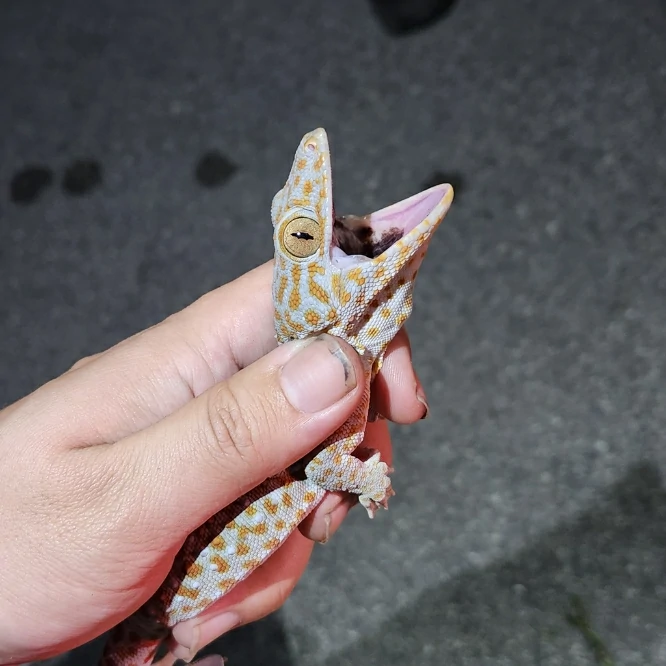Seeing a gecko in your house or suddenly coming across one outside can really catch you off guard. They move fast, climb walls, and sometimes make quick movements that might seem like they’re trying to attack.
If you’re not used to them, it’s easy to wonder if they’re dangerous or if they might try to hurt you. So, do geckos attack humans?
No, geckos don’t attack humans. Geckos are shy, harmless animals that are much more scared of you than you are of them. They don’t have any reason to attack people and will always try to run away and hide when they see someone. The only time a gecko might act defensive is when it feels trapped and has no way to escape.
Geckos are small animals that see humans as giant threats. Their first instinct is always to run, not fight, when they see something as big as a person.
Why Geckos Would Never Attack Humans
From a gecko’s point of view, people look huge and scary.
Even the biggest gecko species, like tokay geckos, only grow about 12 to 14 inches long. Compared to a person, that’s tiny.
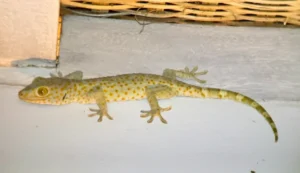
They know they don’t stand a chance, so fighting doesn’t even cross their mind.
Geckos are prey animals. Out in the wild, they have to watch out for birds, snakes, bigger lizards, and even mammals. Since they’re always at risk of being eaten, they survive by hiding and escaping, not by fighting.
And even if a gecko wanted to attack, it just couldn’t do much damage. They don’t have venom, their teeth are tiny, and their bite isn’t strong. So even if one tried, it couldn’t hurt you.
The only time a gecko might bite is if you grab it and it feels trapped. That’s not an attack. It’s just a scared animal trying to protect itself.
What Geckos Do When They See Humans
When a gecko spots a person, its first thought is to get away as fast as it can.
Usually, they run the moment they notice you. Geckos have great eyesight and sharp reflexes, so they almost always see you before you see them.
If one’s sitting on your wall when you walk into the room, it might freeze. Staying still helps it blend in and avoid being noticed. If you get closer, it’ll sprint away, running up walls or into tiny cracks where you can’t reach it.
Sometimes a gecko will drop its tail if it gets really scared. This is called tail autotomy, which means the tail pops off on purpose to distract the predator while the gecko runs off.
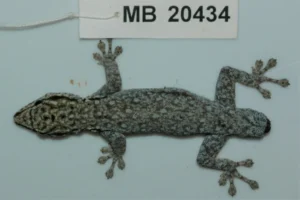
The tail keeps wiggling, which gives the gecko a few seconds to escape. It’s not an attack, just a way to survive.
In rare cases, if there’s no way out, a gecko might face you, open its mouth, or hiss. It’s trying to look tough and make you back away. It’s not angry, it’s just scared and out of options.
Do Any Gecko Species Act Aggressive?
No gecko species actually goes after humans, but some are a bit more defensive than others.
Tokay geckos, for example, are known to be feisty. They’re bigger, louder, and more likely to bite if you try to grab them. Studies on tokay gecko behavior show they’re territorial and will defend themselves if they feel threatened.
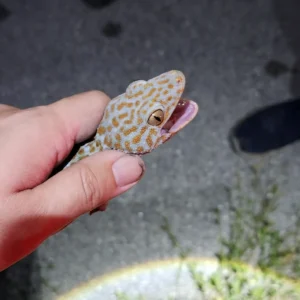
But even tokay geckos don’t go after people on purpose. They won’t chase you or attack first. They only bite if you mess with them.
Leopard geckos and crested geckos, which are common pets, are the complete opposite. They’re calm, easy to handle, and almost never bite. After generations of living with humans, they’re totally used to us.
House geckos are even more harmless. They’re jumpy and will run from even the smallest movement. They’d rather vanish into a corner than stand their ground.
So even when people call a gecko “aggressive,” it’s really just being defensive. It’s scared, not angry.
Can a Gecko Bite Hurt You?
If a gecko bites you, don’t worry, it’s usually not painful and never dangerous.
Small geckos, like the ones you find around your house, have teeth so tiny you might not even feel the bite. It’s more of a surprise than anything else.
Medium-sized ones, like leopard geckos, can give a small pinch. It might break the skin a little, but it’s not serious.
The tokay gecko has the strongest bite out of all the common species. It can hurt for a few seconds and might draw a bit of blood, but it’s still not bad. It’s nothing compared to a cat scratch.
Even the strongest geckos can’t do real damage. Their bites are annoying, not dangerous.
And since they don’t have venom or carry diseases through their bite, there’s nothing to worry about. Just wash the area with soap and water to keep it clean.
Are Geckos Dangerous to Children?
No, geckos aren’t dangerous to kids either.
The only problem is that children might try to catch or hold them. If that happens, the gecko could bite out of fear. But even then, it’s not serious.
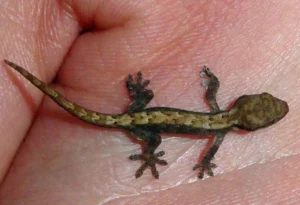
The real thing to watch out for is salmonella. Like many reptiles, geckos can carry it on their skin. So if a child touches one and then puts their hands in their mouth before washing, they could get sick.
It’s best to teach kids to look at geckos but not touch them. If they do touch one, have them wash their hands right away.
Also, small kids might accidentally hurt geckos by squeezing too hard or dropping them. The gecko’s the one at risk, not the child.
So geckos shouldn’t be pets for very young kids. Children under 5 usually can’t handle them safely yet. Older kids who can be gentle and careful are fine.
Myths About Gecko Attacks
There are a lot of stories about geckos that just aren’t true.
Some people believe that if a gecko falls on you, it’s poisonous or will give you skin problems. That’s not true.
Geckos don’t have venom or anything toxic on their skin. These old beliefs don’t have any science behind them.
Another myth says geckos can spit or spray venom. They can’t. The most they can do is open their mouth or lick their eyes.
Some people think geckos hiss or make sounds to scare people, but they’re actually just communicating with other geckos. And when they open their mouths, it’s often to cool down, not to threaten anyone.
There’s also a myth that geckos can bite and hang on forever. That’s not true either.
They might hold on for a few seconds, but they don’t have locking jaws. They always let go quickly.
These stories probably came from fear or misunderstanding. People tend to assume the worst about reptiles, but once you understand them, you realize geckos aren’t scary at all.
What to Do If You Find a Gecko
If you find a gecko inside your house, the best thing to do is leave it alone.
Geckos eat mosquitoes, flies, cockroaches, and other annoying bugs. They’re like free pest control that works all night long.
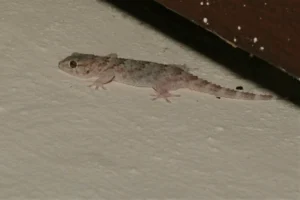
If you really want to move one, use a cup or small box. Gently place it over the gecko, slide a piece of paper underneath, and carry it outside to let it go.
Don’t grab or hurt the gecko. It’s not doing anything wrong. It’s just looking for food and a safe spot to rest.
If there’s one in your bedroom and you don’t want it there, turn on the lights or make a little noise. It’ll move to a darker, quieter place on its own.
People in warm places usually get used to seeing geckos around. Before long, the little clicking sounds they make at night just become part of normal life.
Benefits of Having Geckos Around
Geckos are actually really helpful to have nearby.
They eat a lot of insects. Studies on geckos and pest control show that one gecko can eat dozens of bugs in a single night. That’s a big help if you live somewhere with mosquitoes.
In tropical areas, this even helps protect people from diseases like malaria and dengue by keeping mosquito numbers down.
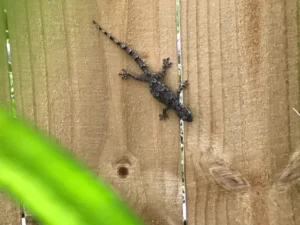
Geckos are clean, quiet, and don’t damage anything. They don’t chew wires, eat food, or make a mess. They just do their job and stay out of the way.
They’re also great for teaching kids about nature. Watching how they move and hunt can be fun and educational.
Many people who used to be scared of geckos end up liking them once they understand how harmless and useful they are.
How to Live Peacefully with Geckos
If you live in a place where geckos are common, the best thing to do is learn to live with them.
They’re part of the local environment and help keep bugs under control. Trying to get rid of them completely doesn’t make sense.
Keep your home clean and fix cracks where bugs and geckos might come in. If you have fewer insects, you’ll naturally have fewer geckos too.
Don’t use chemical sprays because those kill the insects that geckos eat, and sometimes poison the geckos too. Let nature take care of things instead.
Teach others in your home that geckos are harmless and helpful. Once people stop being scared of them, it’s much easier to live together.
Conclusion
Geckos don’t attack humans. They’re small, gentle animals that just want to stay safe and catch insects.
If a gecko ever bites or acts defensive, it’s not because it’s angry. It’s scared and trying to protect itself.
So instead of being afraid of geckos, try to see them for what they really are; quiet, helpful neighbors who keep the bugs in check.
Next time you see one, just let it be. It’ll go back to minding its own business while keeping your home a little more comfortable and bug-free.
Hi, my name is Ezra Mushala, i have been interested animals all my life. I am the main author and editor here at snakeinformer.com.

